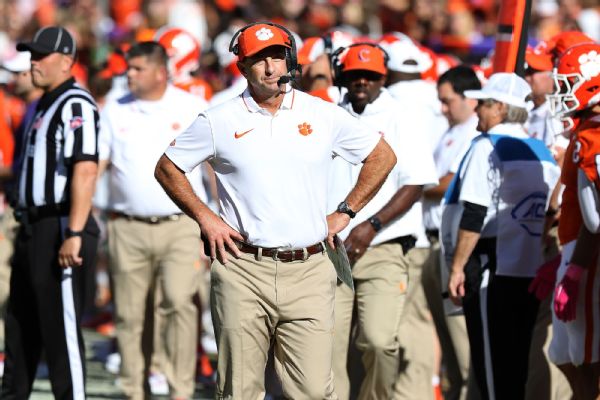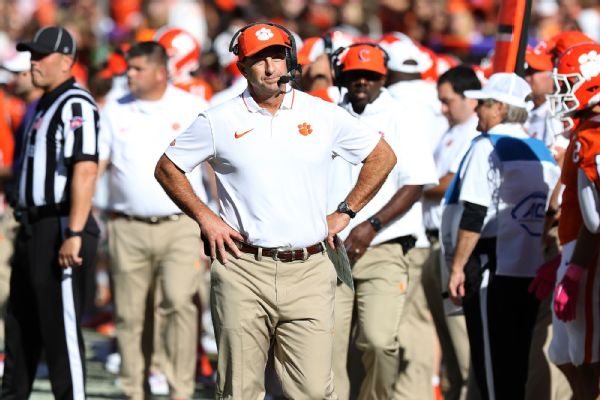
CLEMSON, S.C. — Dabo Swinney used to say he’d be in favor of college football returning to the BCS era for the postseason, and while he’s changed his tune a bit as the sport heads into its first season with a 12-team playoff, he said he’s wary of potential “unintended consequences” he foresees as a result of the increased emphasis on the playoff.
Clemson‘s coach said Tuesday he anticipates the shift to an expanded playoff could lead to frequent in-season opt-outs from players or teams sitting their stars if a playoff berth is already locked up.
“You’ll probably see some guys, if you’re 4-4 and out of the playoffs, will probably head off to Arizona and train [for the NFL],” Swinney said. “You’ll see some situations like the NFL, where if the Ravens are in the playoffs and have it locked up with one more game that really means nothing, do you play Lamar [Jackson] in that game?”
Unlike the NFL’s final week, however, Swinney noted a team’s decision to rest stars at the college level could impact historic rivalry games.
“Maybe you’re 11-0 and have a rivalry game,” Swinney said, “but you have your biggest foe the next week in a conference championship and if you win that game, you’re going to get a [playoff] bye. Those are things that you’ll see play out all through college football.”
Swinney said college football has become more “NFL-like” with playoff expansion from two teams to four to 12, (and, he said there’s an expectation it will expand again in two years), shifting the focus from winning every game during the regular season to winning enough to make the playoff.
In Clemson’s case, the Tigers open this season against Georgia in a matchup that comes with ample hype but, because of the expanded playoff, also doesn’t likely doom the loser to long shot playoff odds.
“From our standpoint, the psyche hasn’t changed; we’re all-in trying to win every single game,” Swinney said. “But as coaches, you have perspective. Big win, tough loss, you’ve got to move on because you want to have a great season. … When you play the best of the best, you’re not going to just walk in and win every time. That’s not the real world.”
If anything, Swinney thinks games against teams like Georgia ultimately benefit any team looking to build a playoff résumé. He said strength of schedule will likely become an even bigger focus on which teams make the playoff and where they’re seeded moving forward.
The SEC and Big Ten are already getting a larger slice of playoff revenue based on the expectations those leagues will put more teams into the postseason, but Swinney said he’s not concerned about arguments that a three-loss SEC team, for example, would have a better case than a one- or two-loss ACC team because Clemson routinely schedules challenging nonconference games against the SEC and Notre Dame.
That’s where the impact of the Georgia game could be felt this season, Swinney said. A win gives Clemson a leg up moving forward, but even a loss — assuming it’s not a blowout — could be a boost to the Tigers’ overall résumé. The key, of course, is that Clemson performs well on the rest of its slate, too.
“It’s a huge game, and you’re coming right out of the gate playing a team like that,” Swinney said. “You find out where you are in that moment for sure. But you can’t let that moment define the rest of the season, even if you win it.”












